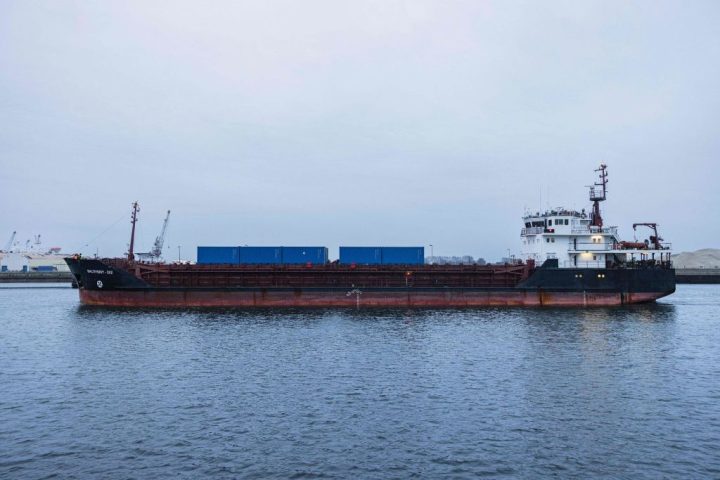The news that Russian spy ships appear to be mapping British and other underwater cables and pipelines in the North Sea sounds very Cold War. But in fact it reflects the realities of modern conflict, and also the ways Moscow is playing psychological games with the West.
In November, The Admiral Vladimirsky, an Akademik Krylov-class ship officially classified as an oceanographic research vessel but regarded by Western authorities to be an intelligence-gathering asset, entered the Moray Firth and loitered near the RAF’s maritime patrol base at Lossiemouth. Since then, it has been on a tour around British and Nordic waters, on a route that took it past seven British and Dutch offshore wind farms and then a Swedish naval training ground.
Unsubtle reconnaissance campaigns like this are a warning to the West: just think what we could do, if we wanted
Again, it dawdled while close to each, and tellingly kept its automatic locator system switched off in that time, not exactly regular practice for a civil research vessel. Nor was the camouflaged and masked rifleman – every inch a Russian morpekh or naval infantryman – who warned off a boatload of Danish journalists when they got too close.
This is part of a recent pattern of Russian ‘fishing boats’ and ‘research ships’ showing an otherwise-inexplicable interest in Western underwater infrastructure. Russia has long been rebuilding a capability in underwater reconnaissance and sabotage that, like so many other legacies of the Soviet era, fell into disrepair in the 1990s and early 2000s.
Now, GUGI, the Russian Defence Ministry’s euphemistically-named Main Directorate of Deep Sea Research, has two large submarine motherships able to deploy mini-submarines and underwater drones. It also has a fleet of surface ships such as the Yantar ‘research vessel’ that has been used both to map oceanic communications cables and recover aircraft that crashed into the sea, as well as the smaller Ladoga. (GUGI also reportedly has a secret programme to train Beluga whales as scouts and maybe even saboteurs. This might have seemed fanciful until one turned up – we cannot quite say it defected – in Norwegian waters in 2019.)
Aside from the bombing of the Nord Stream 2 pipelines, currently being blamed on everyone from the Americans and the Russians to, most recently, Ukrainian freelancers, last year an underwater data cable off the Norwegian coast was also severed. The causes are still uncertain – it could have simply been a drag net – but it has concentrated minds on the potential risks.
This has to be kept in context, though. The way the Ukraine war has become, in many ways, a proxy war between Russia and the West has actually diminished the scope for old deniable ‘grey zone warfare’ operations.
In the past, Western governments were often paralysed by a legalistic desire to prove Moscow’s hand behind actions such as the 2014 Vrbetice bombing in the Czech Republic (when ammunition destined for Ukraine was blown up by Russian military intelligence operatives) or the 2019 Berlin assassination (when a Georgian Chechen was murdered by a hitman working for Russia’s Federal Security Service). Now, there would be fewer such constraints and qualms were, say, an energy cable to be cut under circumstances suggesting hostile action.
Moscow realises this. What has been quite striking is just how cautious it has been since the start of the war, bombing and murdering with abandon inside Ukraine but being careful to avoid any risks of a direct confrontation with Nato. We have not seen more Vrbetices, and while Russian aircraft have bumped an American drone into the sea, the one time they fired at a British aircraft, it was because of pilot error, not policy.
Instead of assuming that some sabotage campaign is necessarily on the cards, we should see this as a mix of contingency planning and political warfare. Should matters escalate, the Russians want to be in a position to attack a range of Western targets, including our communications and energy infrastructures.
In the meantime, unsubtle reconnaissance campaigns like this are intended as a warning to the West: just think what we could do, if we wanted. With 97 per cent of internet traffic passing through undersea cables, including much of our financial data, and offshore wind farms playing a major role in national energy strategies (arguably a good reason for more onshore ones), we are more vulnerable to such attacks than the Russians. We know it and they know it.
Got something to add? Join the discussion and comment below.
Get 10 issues for just $10
Subscribe to The Spectator Australia today for the next 10 magazine issues, plus full online access, for just $10.



















Comments
Don't miss out
Join the conversation with other Spectator Australia readers. Subscribe to leave a comment.
SUBSCRIBEAlready a subscriber? Log in